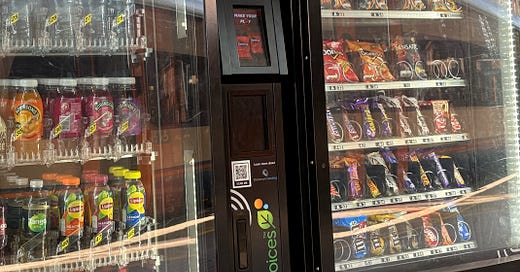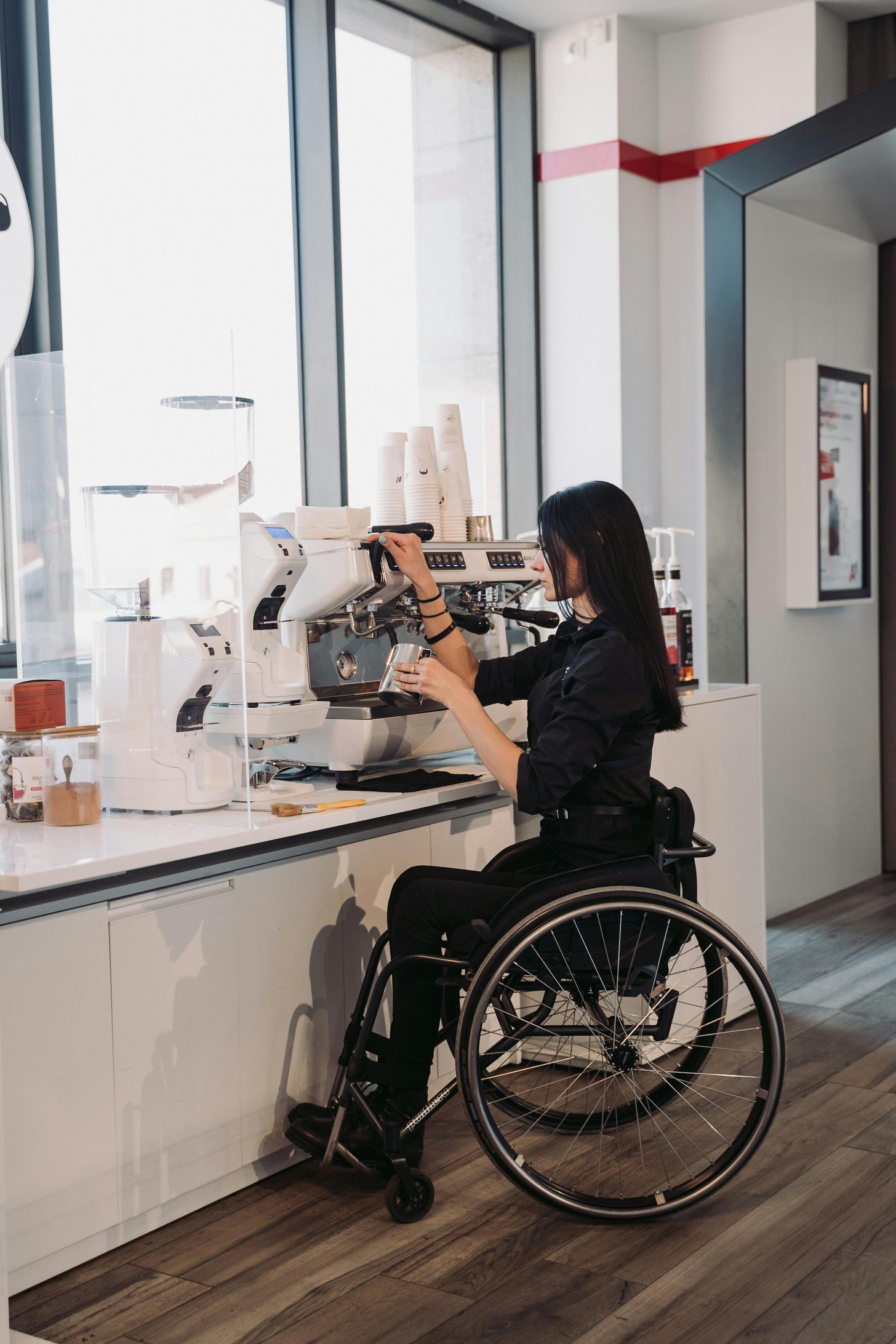Thirst, Coffee, and Contracts: The Real Test of Business Accessibility
Why Accessible Procurement Matters
You can listen to the main article in this newsletter here:
Recently, after a long train journey with no refreshments available, I arrived at Nottingham station feeling extremely thirsty. Eager for a drink, I approached the vending machine—only to find that the touch pad for credit cards was installed so high I could barely reach it. I had to awkwardly stretch my arm and hold the credit card with my fingertips to make a purchase, which not only felt uncomfortable but also unsafe, as someone could have easily grabbed my card from my fingers.
Experiences like this highlight a broader problem: despite many companies claiming that accessibility is a core value, it’s often quite obvious that some actions are clearly missing. Inaccessible facilities, such as vending machines’ payment devices placed too high, force disabled people and people who are smaller to rely on strangers for help, undermining both safety and independence. These issues usually don’t stem from a lack of resources, but rather from simple oversights, such as failing to specify accessible requirements in procurement contracts when outsourcing services.
Coffee by mobile phone
A positive example is from my partner’s workplace. There, the office coffee machine can be operated entirely via a mobile phone. This makes it fully accessible for my partner, who is blind; he can order his coffee without touching the machine, using the voice-over functionality of his iPhone, and then he picks up his cup when it’s ready. Small, thoughtful steps like this make a huge difference, and they’re easy to implement when procurement teams understand their role in ensuring accessibility.
Unfortunately, the problem of inaccessible machines isn’t limited to railway stations. Vending machines in hotels, airports, and other public spaces are often designed in a way that excludes not only wheelchair users but also anyone who isn’t tall enough to reach the controls.
Reception desks and welcome counters present similar challenges. Even when lower counters are provided for wheelchair users, they’re often left unstaffed, or customers are randomly assigned to different counters, so a wheelchair user might still be directed to a high counter. At the same time, a non-disabled person uses the accessible one.
These examples demonstrate that accessibility is not inherently built into the operations of many businesses. Most of these problems can be traced back to procurement decisions. If companies simply requested accessible options when outsourcing services or purchasing new equipment, many barriers would disappear at zero cost.
By making accessibility a genuine priority - through thoughtful procurement and everyday decisions - companies can create environments that serve everyone equally, not just in words, but in practice. Small changes, such as ensuring machines are installed at accessible heights or offering alternative ways to interact with equipment, can make a significant difference for all customers. It also influences the market. If companies, especially large operators, airport groups, and hotel chains, reject inaccessible solutions, the market will adjust.
Some interesting links
Virgin Atlantic apologises after using Level 2 BSL signer for ‘infantilising’ TV ad.
Railway operators in the UK may soon be required to pay sums in line with the Equality Act 2010 levels of compensation to disabled passengers who have not received adequate assistance. The rail regulator, the Office of Rail and Road (ORR), has warned companies running trains and stations that compensation claims for failures can no longer be limited to the cost of a ticket after activist Doug Paulley took legal action against the regulator.
The Royal National Institute of Blind People has published a new report on bus travel. The report shows that fewer than half of blind and partially sighted people can make the bus journeys they want or need to.
Wheelchair user Anna Landre tried to travel from Liverpool Street station and requested assistance by “Turn Up and Go”. Network Rail staff had no time to provide her with a ramp, but they had time to lecture her about disability rights and then refused to assist her at all afterwards. The whole saga was covered by the British Media, including Good Morning Britain. Additionally, The Daily Mail, The Independent, The Evening Standard, and The Telegraph covered the story.
Something to read
Disability Wales has published a Social Model of Disability Toolkit (a Word document is also available). This toolkit has been developed to explain the social model and provides insight into how it can be implemented in daily life and organisational settings.
Something to watch
If you don’t know what to watch next, I highly recommend “Deaf President Now!” on Apple TV. The documentary recounts the eight days of historic protests held at Gallaudet University in 1988, following the school’s board of trustees' appointment of a hearing president over several highly qualified Deaf candidates. After a week of rallies, boycotts and protests, the students of Gallaudet University triumph as the hearing president resigns and beloved dean Dr. I. King Jordan becomes the university’s first Deaf president. The protests marked a pivotal moment in disability rights history, with an impact that extended well beyond the Gallaudet campus and paved the way for the Americans with Disabilities Act (ADA).
Some final words
The Accessible Link is a reader-supported publication. So, if you like what you’re reading, consider to
As a paid subscriber, you will receive an additional edition every two weeks with best-practice tips on improving accessibility in your organisation.
Who is writing this newsletter?
I’m Christiane Link, and I improve the customer experience in aviation, transport, and travel. I worked as a journalist for over two decades and travelled extensively for business and leisure. I’m a wheelchair user.
Work with me
Whether you're a Customer Service Director, a Head of Customer Experience, a corporate Accessibility manager, a DEI leader, a transport planner, or a disabled employee resource group member, I can help you to make your organisation more inclusive. You can book me for speaking engagements or hire me as a consultant for your accessibility or DEI strategy, communications advice and other related matters. I have worked for airlines, airports, train operators, public transport providers, and companies in other sectors.
If you want to read more from me, follow me on LinkedIn, Twitter, Bluesky or Mastodon. You can also reply to this email if you want to contact me.
.






